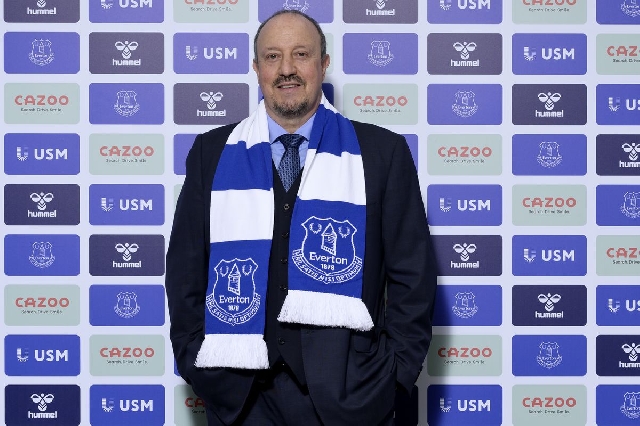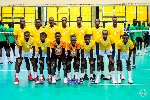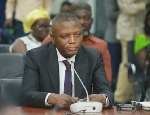Everton appoint Rafael Benitez as manager
 Rafael Benitez
Rafael Benitez
Everton have appointed former Liverpool boss Rafael Benitez as their new manager.
The 61-year-old Spaniard has signed a three-year deal and succeeds Carlo Ancelotti, who resigned in early June to return to Real Madrid.
"I am delighted to be joining Everton," said Benitez.
"I believe this is a club that is going places. I'm determined to play a big part in helping this great club achieve its ambitions."
Benitez last managed in the Premier League at Newcastle United before leaving in June 2019.
He moved to China to coach Dalian Professional FC and left them in January after 18 months in charge.
Everton say Benitez "will commence work with the squad when they return for pre-season training from 5 July".
They added that he was given the job "after a robust and wide-reaching recruitment process over the last three weeks - a process which has included multiple interviews with several candidates".
Everton majority shareholder Farhad Moshiri said: "Rafa impressed us greatly with his knowledge and experience but, above all, the passion and hunger he showed to join our club.
"We are appointing Rafa because we believe he will bring success to our club and to Evertonians. To put it simply - we need to be competing at the top end of the league and to be winning trophies.
"Rafa is a proven winner with huge experience in coaching internationally and we have secured the best man to achieve that for us."
Historic move
In a historic and controversial move, Benitez joins William Edward Barclay, who was part of the original foundation of Everton in the 1890s and later the breakaway Liverpool club, as the only men to cross the city divide to manage both clubs.
Before he signed the prospect of him managing the club had brought a mixed reaction from Everton fans, with then-Liverpool boss Benitez causing a furore by calling the Blues a "small club" following a goalless derby at Anfield in February 2007.
Benitez insisted he made "a mistake" and was referring to the approach of David Moyes' team rather than Everton as a club, but his remarks have not been forgotten by many on the blue half of Merseyside.
Several banners were hung up outside Goodison Park protesting at Everton's move for Benitez, while Merseyside Police are investigating a banner reading "We Know Where You Live - Don't Sign" aimed at Benitez - although it was actually left outside the wrong house.
"I know that the last few weeks have not been an easy time for our supporters so I'd like to thank them for their patience throughout this process," added Moshiri.
"Hopefully now we can come together and be confident about our plans on and off the field. There are some exciting times ahead and I hope the supporters know that they have my full commitment in terms of delivering our ambitions."
Former Wolves boss Nuno Espirito Santo was the early favourite after interest from Everton but Benitez had been in pole position for a fortnight after staging several rounds of talks.
Benitez, who kept a home in the area even after leaving Liverpool in 2010, was keen to return to the Premier League after leaving Newcastle United in summer 2019 before a spell at Chinese Super League club Dalian.
Benitez is no stranger to walking into a potentially hostile environment after the reception he received when he took over as Chelsea's interim manager in November 2012 following a long, intense rivalry when he was in charge of Liverpool.
The Spaniard was roundly jeered when he took charge for his first game at home to Manchester City at Stamford Bridge - but was a resounding success, winning the Europa League and guiding them to third place in the Premier League.
The former Napoli and Real Madrid boss joins an Everton side that finished 10th in the Premier League under Ancelotti last season.
Everton begin their 2021-22 season at home to Southampton on 14 August.
The club will confirm the staff who will join Duncan Ferguson and Alan Kelly as part of Benitez's backroom team in the coming days.
Source: BBC
Trending Sports

President of AFA embarks on a 4-day working visit to South Africa
10:25
Letsile Tebogo: How sports took Botswana's Olympic champion away from the path of crime
21:21
El-Wak Wings seeks support ahead of African Clubs Volleyball Championship in Libya
02:21
Women's football: Ghana beats Senegal 1:0, rematch tomorrow April 8
13:29
Maiden meeting for new CAF Executive Committee scheduled for April 26 in Accra
20:29
Odartey Lamptey names 25 players for Ghana's U-16 camping
20:13
Minister of Sports inaugurates committee to probe death of Nigerian boxer in Accra
13:16
Ronaldo pays tribute after death of former coach
12:22
Agyeman Badu laments terrible salaries for local players, suggests threshold
23:22



